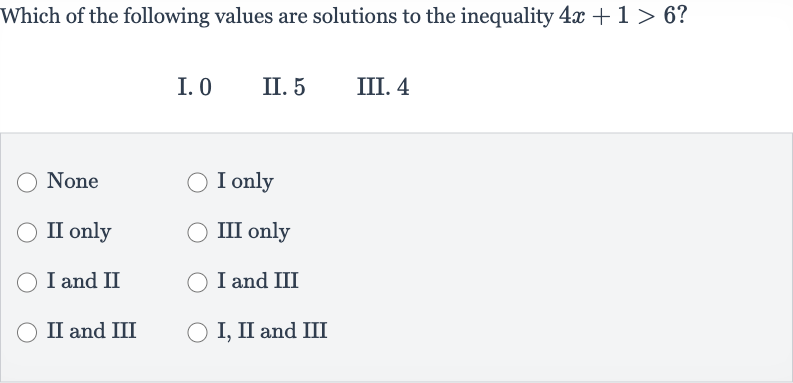Full solution
Q. Which of the following values are solutions to the inequality I. II. III. NoneI onlyII onlyIII onlyI and III and IIIII and IIII, II and III
- Solve Inequality for x: Solve the inequality for x.We start by subtracting from both sides of the inequality to isolate the term with .4x + 1 - 1 > 6 - 1This simplifies to:4x > 5Next, we divide both sides by to solve for .\frac{4x}{4} > \frac{5}{4}This gives us:x > \frac{5}{4}
- Test Value I: : Test the first value, I. . We substitute with in the inequality x > \frac{5}{4}. 0 > \frac{5}{4} This statement is false because is not greater than . Therefore, I. is not a solution to the inequality.
- Test Value II: : Test the second value, II. . We substitute with in the inequality x > \frac{5}{4}. 5 > \frac{5}{4} This statement is true because is greater than . Therefore, II. is a solution to the inequality.
- Test Value III: : Test the third value, III. . We substitute with in the inequality x > \frac{5}{4}. 4 > \frac{5}{4} This statement is true because is greater than . Therefore, III. is a solution to the inequality.
- Combine Solutions: Combine the results from Steps , , and to determine which values are solutions.From the previous steps, we have determined that:I. is not a solution.II. is a solution.III. is a solution.Therefore, the values that are solutions to the inequality are II and III.
More problems from Solutions to inequalities
QuestionGet tutor help
QuestionGet tutor help
QuestionGet tutor help
QuestionGet tutor help
QuestionGet tutor help
QuestionGet tutor help
QuestionGet tutor help
QuestionGet tutor help

